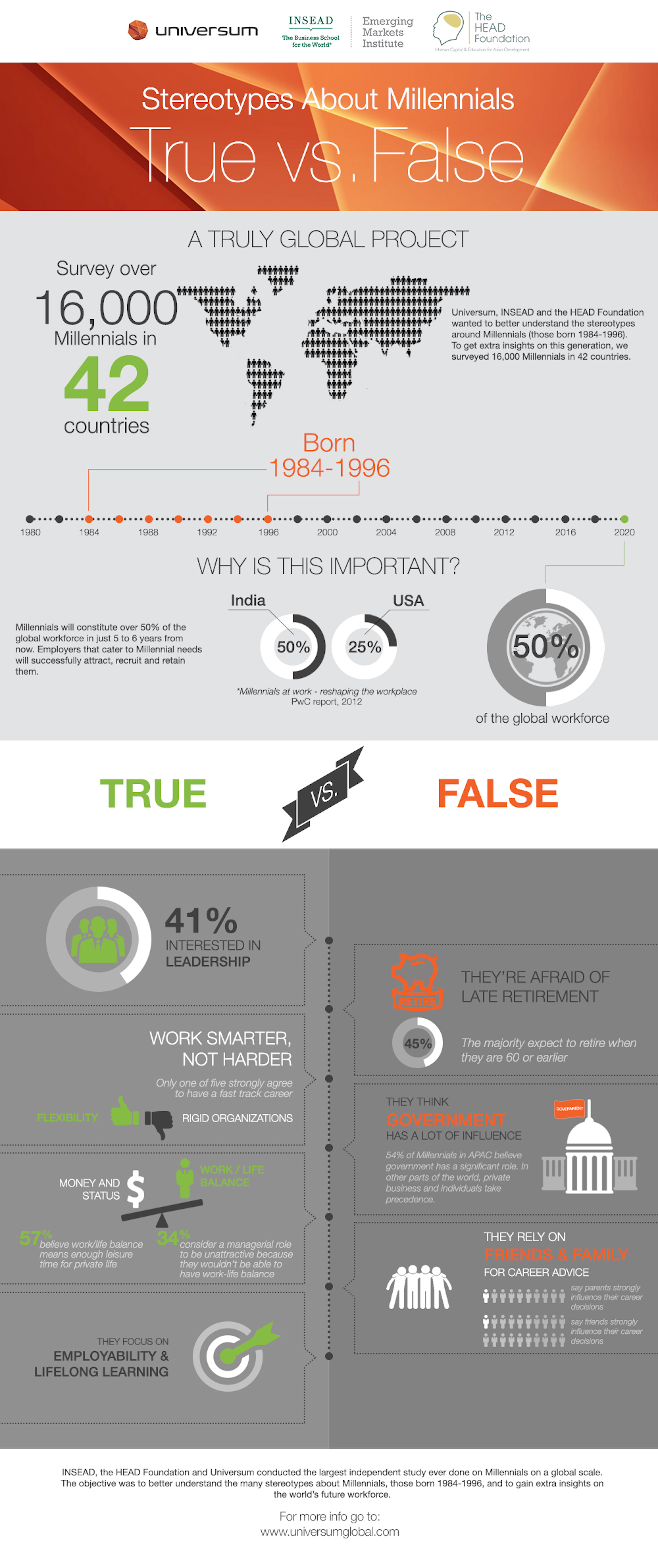It Seems We’ve All Misunderstood the Millennials [Infographic]

Is it really surprising to learn that millennials are a “misunderstood generation,” in the words of INSEAD, the HEAD Foundation, and Universum’s study? To me, this isn’t a shocking finding.
Perhaps it’s because I, myself, am a millennial, and many of my friends, colleagues, and loved ones are millennials, and I have seen firsthand how this generation can be both staggeringly diverse and totally, genuinely, normal.
But I think there’s more to it than that. Millennials have been the subject of countless think pieces and the cause of much hand-wringing, and much of the writing on and thoughts about millennials has been alarmist in nature. The problem with all of these “studies” and essays is that they approach millennials as a monolithic group, rather than a diverse collection of people with their own beliefs, cultural experiences, and life goals.
Moreover, many of those commenting on millennials have viewed them through only the narrowest of lenses. As written in part one of the Universum/INSEAD/HEAD Foundation study, “research focused on [m]illennials up until now has been regional in scope (e.g., U.S.-only or Euro-centric studies) or limited to a single category of study (e.g. technology adoption). No single study to date has examined the case and cause of [m]illennials more broadly.”
Universum et al. decided to widen the scope and survey millennials globally, viewing the members of the generation through a number of lenses. The result?
“[Millennials are a] much more diverse group than perhaps research in the past has been saying,” says Dustin Clinard, managing director, North America, at Universum. “Most research out there says that all millennials are the same, and that is simply not true. If you look at a global perspective, as we did in this study, you can see that millennials want different things depending on their backgrounds and where they are from.”
And what sort of things do millennials want? What sort of things do they value? What do they believe? Some highlights from the study include:
- 70 percent of millennials across the globe say they are interested in “leadership positions and rapid career advancement; however, millennials from different areas “value the benefits of leadership quite differently.” In Africa, millennials say that the opportunity to coach and mentor others is “the most attractive benefit” of obtaining a leadership position, whereas millennials in Central Europe, Eastern Europe, and North America “value the opportunity to influence the organization they work for.”
- Millennials care about work-life balance, but their personal priorities differ quite a bit. Overall, 58 percent of millennials would like to “spend time with family if given the opportunity to prioritize,” but millennials in the Middle East are less keen on family time. For them, 49 percent say that learning new things is more important than spending time with family; another 49 percent say having a successful career is also more important than spending time with family.
- Many people believe millennials are too attached to mommy and daddy’s hips, but the study finds that many millennials are opposed to “involving their parents in their career decisions.” In Central and Eastern Europe, 61 percent of millennials said they objected to involving their parents in their professional lives. In Africa, on the other hand, 51 percent said they were “likely to involve parents” in their career decisions.
What’s the take away in all of this?
“Not to look at millennials as one group, but really dig deeper to understand what they want, depending on their background, culture, or where they are from,” says Jonas Barck, global director of media and public relations at Universum.
Millennials, as part one of the study concludes, are a “heterogenous generation”: “While commonalities exist, region by region [m]illennials are unbelievably diverse in their opinions and actions.”
With this conclusion in mind, “Understanding a Misunderstood Generation” recommends that companies develop a “granular strategy” when courting millennial talent.
“[Look at] the target talent groups [you] are recruiting and really understand who they are, where they are from, and what culture they come from to communicate to them on a more individual basis,” says Lars Rydtzander, global CMO of Universum. “The one approach method simply does not apply to this group.”
Next up:Part two: “Our Greatest Fears”


